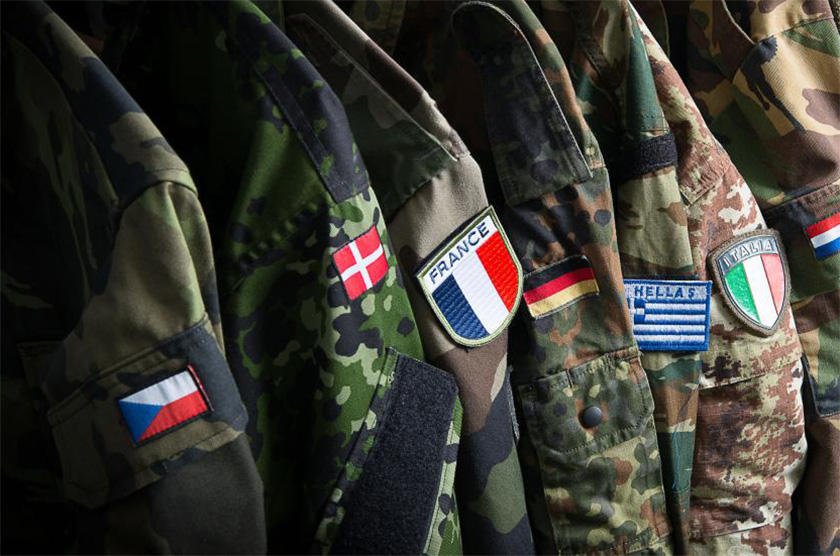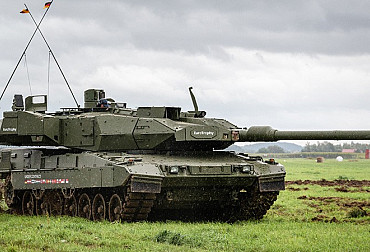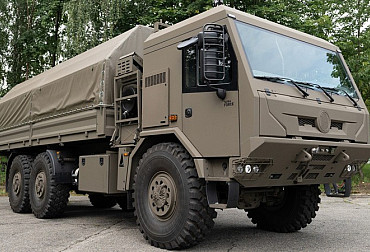Military diplomacy: an important tool in the international security architecture of the 21st century
In today's globalised world, military diplomacy is one of the important tools for international cooperation and building a security architecture. In the context of the dynamically changing nature of international relations and newly emerging security challenges, its ability to effectively link the political, military and economic dimensions of interstate relations is of particular importance. This comprehensive approach is particularly evident in the North Atlantic Alliance, where the Czech Republic is systematically developing its diplomatic presence.

Military diplomacy has undergone a major transformation in recent decades. It has evolved from an originally highly specialised discipline, primarily oriented towards military-technical cooperation and intelligence exchange, into a sophisticated instrument of international relations. Today's military diplomacy encompasses a broad spectrum of activities ranging from strategic communication and conflict prevention to building mutual trust and coordinating complex multilateral military operations.
The importance of military diplomacy increased dramatically in response to the fundamental transformation of the security environment after the end of the Cold War. Instead of a neat bipolar order, the international community faces multilayered threats involving state and non-state actors, conventional and hybrid forms of warfare, and the exponentially growing importance of new operational domains including cyberspace and outer space.
Effective military diplomacy in this complex environment requires a deep understanding of the geopolitical context, technological trends, and strategic interests of the various actors. Diplomats specializing in this area must combine expertise in international relations with detailed knowledge of military issues and the ability to navigate a complex multilateral environment.
Aspects of military diplomacy
In the current international system, military diplomacy performs several indispensable functions. Primarily, it serves as a confidence-building tool between states through transparent communication of military capabilities, intentions and doctrinal approaches. This role is also of particular importance in the context of current geopolitical tensions and the emergence of new power centres on the global stage.
The second fundamental aspect of military diplomacy is its contribution to international security cooperation. Through a network of permanent diplomatic missions, military attachés and specialised working groups, it enables systematic coordination between the armed forces of different states, the harmonisation of military doctrines and standards, and the sharing of best practices in training and operational deployment.
A specific and increasingly important dimension of military diplomacy is its role in defence industry and technological cooperation. This is illustrated by several notable cases in recent history.
Specific cases of military diplomacy
The role of military diplomacy in the context of Russia's aggression against Ukraine is an important case study. After February 2022, military diplomacy played a key role in coordinating unprecedented international support for Ukraine. Military diplomats mediated complex negotiations on transfers of military equipment, coordinated training programmes for the Ukrainian armed forces, and ensured the harmonisation of the approaches of the various supporting states. The Czech Republic played a significant role in this process, being one of the first states to provide heavy military equipment to Ukraine and subsequently coordinating international efforts to secure ammunition and spare parts.
The second illustrative example is the process of acquiring F-35 fighters for the Czech Air Force. This complex project, launched in 2022, is a textbook example of modern military diplomacy. Czech military diplomats conducted complex negotiations not only with the US side, but also with other European users of the F-35, in particular Poland, Finland and Norway. The result was not only the negotiation of favourable acquisition terms, but also the creation of a framework for long-term industrial cooperation and the involvement of Czech companies in the global supply chain of the F-35 programme.
The third case study is the activities of the Centre of Flight Training (CLV) in Pardubice. This training centre demonstrates the ability of Czech military diplomacy to transform national expertise in the field of aviation training into a concrete contribution to strengthening alliance capabilities. The centre now provides standardised training for both Czech Air Force pilots and foreign pilots and is an example of a successful specialisation of a medium-sized nation within the Alliance.
The fourth example is the role of Czech military diplomacy in the development of alliance capabilities in the field of cyber defence. In 2024, the Czech Republic hosted the Cyber Coalition exercise, the largest cyber exercise in NATO history. The success of the exercise, which was attended by over 1,000 experts from 31 member states and partner countries, strengthened the Czech Republic's position as one of the leaders in the field of cyber security.
The above specific cases illustrate the transformation of military diplomacy into a key instrument of international cooperation. Diplomatic negotiations now provide the necessary framework for the implementation of strategic international projects, from the joint development of advanced weapons systems to the sharing of critical technologies to the building of integrated industrial capabilities. The importance of this dimension of military diplomacy is continuously growing, especially given the unprecedented complexity of modern military systems and the increasing cost of their development. No state today can afford to develop advanced military technologies in isolation, making military diplomacy an indispensable tool for building effective international defence cooperation.
The North Atlantic Treaty Organization is a paradigmatic example of modern multilateral military diplomacy. Within NATO, a sophisticated system has evolved, including permanent military representatives, specialised committees and working groups, and an extensive network of liaison officers. This sophisticated mechanism allows for effective coordination among the thirty-one member states and the Alliance's continuous adaptation to emerging security challenges.
The Czech Republic, as a medium-sized state with adequate military capabilities, uses military diplomacy as a strategic tool to maximise its influence and secure its vital security interests. Czech diplomatic engagement focuses on several priority areas. Within the Alliance, Czech military diplomacy focuses primarily on strengthening collective defence mechanisms, particularly in relation to NATO's eastern flank. It also plays an important role in the process of modernisation of the armed forces, where diplomatic negotiations create conditions for the implementation of strategic acquisition projects.
Trends in military diplomacy
The future of military diplomacy will be shaped by several key trends. The accelerating development of advanced technologies, particularly in the areas of cyber security, artificial intelligence and autonomous systems, is creating the need for new forms of diplomatic cooperation. Military diplomats must have a deep understanding of the technical aspects of these technologies and their implications for international security.
Another important trend is the deepening interdependence between the military and economic dimensions of international relations. Military diplomacy is becoming an integral part of economic diplomacy, especially in the context of the internationalisation of the defence industry and technological cooperation. This trend is strongly reflected, for example, in the growing importance of offset programmes in the implementation of international arms contracts.
The third defining trend is the need to adapt military diplomacy to the issue of hybrid threats and the so-called grey zone of conflict. Traditional tools of military diplomacy must be complemented by innovative approaches capable of addressing complex security challenges combining military, political and economic tools.
Conclusion
Military diplomacy in the 21st century requires a fundamental rethinking of traditional approaches and concepts. Instead of narrowly focused communication between the military establishments of different states, it must be transformed into a comprehensive tool capable of effectively addressing the multidimensional security challenges of the contemporary world.
The key to success will be the ability to systematically integrate different aspects of international relations - from high politics to military-technical cooperation to the economic dimension. The example of the North Atlantic Treaty Organization convincingly documents that multilateral military diplomacy can be an effective tool for coordination between states with different capabilities and priorities.
For medium-sized states such as the Czech Republic, sophisticated military diplomacy represents a strategic opportunity to maximise their influence in shaping the international security architecture. Success will depend on the ability to accurately identify areas of specialisation and expertise where they can bring unique added value to the international security cooperation system.
The future of military diplomacy will be characterized by continuously increasing complexity and the need for innovative approaches. States that can adapt their diplomatic tools to the new security realities and effectively link them to other dimensions of international relations will gain a significant comparative advantage in shaping the international security architecture of the 21st century. As the above case studies show, the Czech Republic is well placed to do so. By systematically developing military diplomacy, emphasising specialisation in cyber-security and aviation training, and taking an active approach to regional defence cooperation, it is creating the conditions for strengthening its position within the Euro-Atlantic security community.





















